In the third week of September 2021, the 3rd General Assembly Meeting of the Association of Institutions of Higher Education of the Russian Federation and Japan (the 9th Japan-Russia Rectors’ Forum) was held along with related events.
General Assembly Meeting of the Association of Institutions of Higher Education of the Russian Federation and Japan (Japan-Russia Rectors’ Forum)
The 3rd General Assembly Meeting of the Association of Institutions of Higher Education of the Russian Federation and Japan (the 9th Japan-Russia Rectors’ Forum) (hereinafter referred to as “General Assembly”) was held online on Thursday, September 16. This year’s General Assembly was hosted by Niigata University, and there was a total of 140 participants from 29 Japanese universities and 26 Russian universities. In addition, three universities from Japan (Japan University of Economics, Nagoya University of Foreign Studies, and Tottori University) and six universities from Russia (North-Western State Medical University named after I. I. Mechnikov, Volgograd State University, Moscow State Linguistic University, Moscow City University, Astrakhan State University, and Saint-Petersburg State University of Architecture and Civil Engineering) became new members of the Association of Institutions of Higher Education of the Russian Federation and Japan on the occasion of this General Assembly, bringing the total number of member universities to 63, with 30 from Japan and 33 from Russia.
After opening remarks by President USHIKI Tatsuo of Niigata University and Rector Victor SADOVNICHY of Lomonosow Moscow State University, guest speeches were given by Senior Deputy Minister MARUYAMA Yoji of the Ministry of Education, Culture, Sports, Science and Technology, Deputy Minister Natalia BOCHAROVA of the Russian Ministry of Science and Higher Education, Ambassador Extraordinary and Plenipotentiary of Japan to Russia KOZUKI Toyohisa, and Ambassador Extraordinary and Plenipotentiary of the Russian Federation to Japan Mikhail GALUZIN. The guest speeches were followed by keynote speeches given by President HOUKIN Kiyohiro of Hokkaido University and Rector SADOVNICHY of Lomonosow Moscow State University regarding the activities of the Association of Institutions of Higher Education of the Russian Federation and Japan. In the rectors’ case study reports and discussions, six universities (Tokai University, Tokyo University of Foreign Studies, Kanazawa University, Pacific National University, Northern (Arctic) Federal University, and Irkutsk State University) introduced their efforts in student exchange activities and professional education, and afterward, there was an exchange of opinions among rectors. In the latter half of the General Assembly, the results of the Japan-Russia Student Forum and the Japan-Russia Scientific Forum, which were side events held in the same week, were reported. In the communique adopted at the end of the assembly, which was signed by President HOUKIN, Rector SADOVNICHY of Lomonosow Moscow State University, and President USHIKI of Niigata University, the relevant personnel agreed to promote the exchange of students and young researchers, to strengthen interdisciplinary research and industry-academia collaboration in order to promote science, technology, and innovation that meets the demands of society and global challenges, and to continue to make further efforts to develop friendly relations and exchange activities between Japan and Russia. The next General Assembly is scheduled to be held in Moscow in 2023.
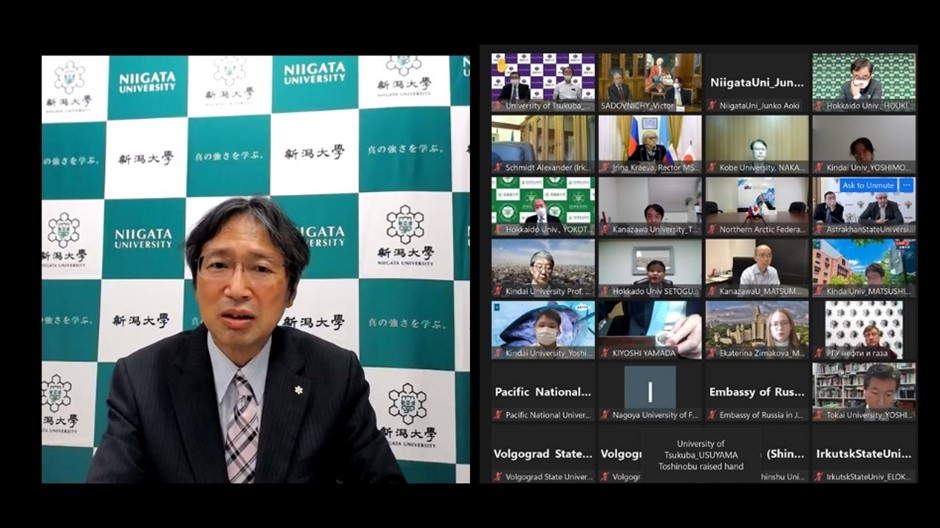
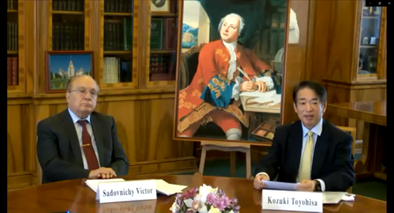
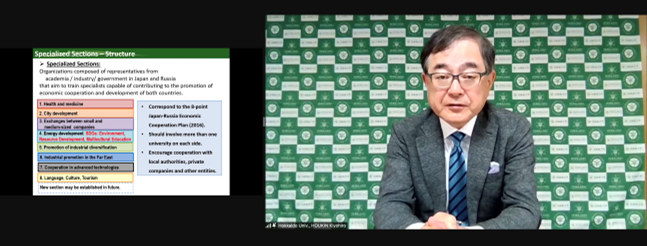
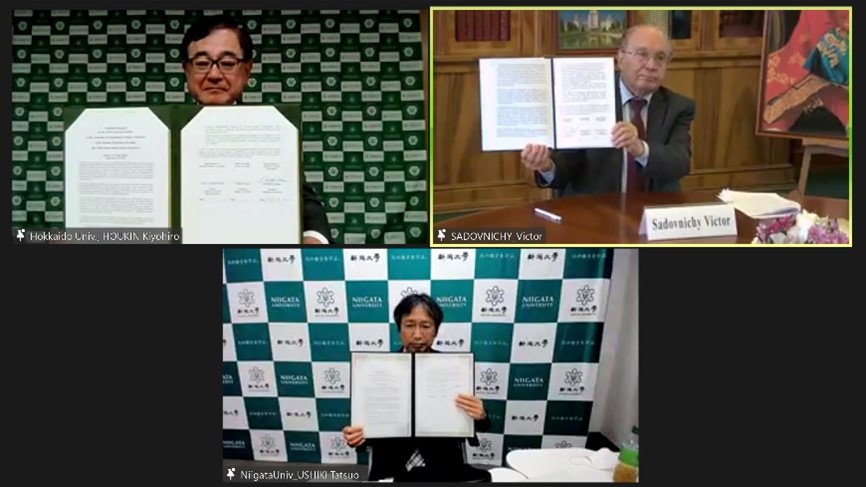
Japan-Russia Student Forum
The Japan-Russia Student Forum was held on September 12 (Sun) and 13 (Mon) under the slogan “Crossing All Boundaries and Sharing Your Ideas,” with about 100 student participants from 21 Japanese universities and 31 Russian universities. The participants first took part in a cultural exchange session where they made presentations and exchanged views about Japanese and Russian culture, regions, student projects, and global issues. The students themselves served as moderators, and 17 students made presentations, after which there was an exchange of opinions. The students were then split according to their preferences into specialized sessions in Medical Sciences; Natural Sciences; Social Sciences; and Humanities, and workshops and other activities were held under the coordination of faculty members to deepen exchanges in their fields of specialization. At the end of the second day, the participating students gathered again to present the results of each specialized session, and summaries were given by student representatives from Japan and Russia, bringing the forum to a successful conclusion. After lively exchanges of views in English over two days, many of the participating students commented that it was a very meaningful forum that enabled them to make friends, and that they would like to participate in such an event in person next time.
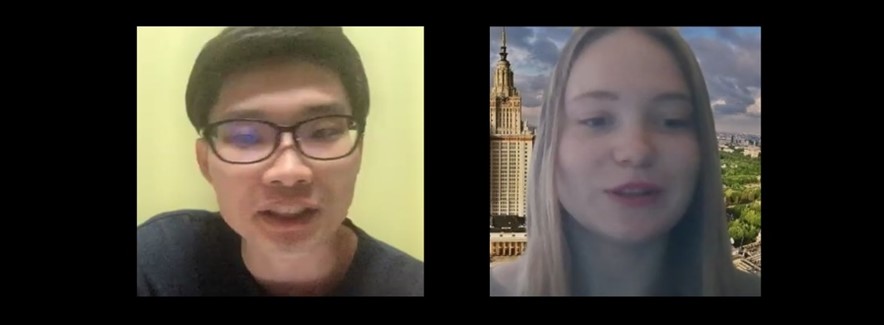
(left: Niigata University student, right: Lomonosow Moscow State University student)
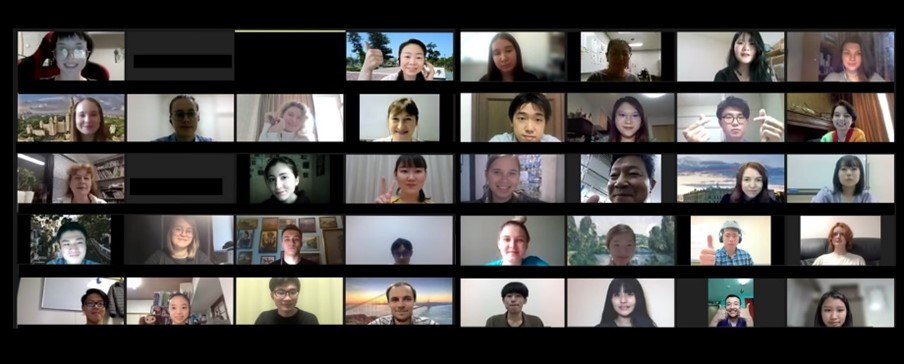
Japan-Russia Scientific Forum
On September 14 (Tue) and 15 (Wed), a total of five Japan-Russia Scientific Forums were held under the two themes of Sustainable Development Goals and medical education.
SDGs : Environment, Resource Development, Multicultural Education
On the occasion of the 3rd General Assembly Meeting of the Association, Hokkaido University, in cooperation with Lomonosow Moscow State University, conducted four scientific forums under the theme of Sustainable Development Goals in an effort to promote academic exchange between Japan and Russia with the aim of achieving the Sustainable Development Goals.
At the Japan-Russia online seminar held on September 14 titled “Sustainable Regional Development, International Cooperation and the Protection of the Arctic Environment,” about 100 researchers and practitioners from government agencies and other organizations from seven countries participated in a discussion about raising environmental awareness in Russia and the activities of local people and organizations that contribute to monitoring and protecting the fragile environment in the Arctic. Furthermore, while clarifying the connection between the environment and the traditional way of life of indigenous peoples, those giving presentations focused on how environmental legislation and the guarantee of indigenous peoples’ rights have been linked. In the latter half of the presentation, various models of local economies and city development, the impact of global decarbonization efforts on sustainable development in the Arctic, and the impact of global warming on international relations in the Arctic were discussed. By holding similar seminars in the future, we plan to continue our efforts towards multi-level governance and cooperation beyond borders for sustainable development and environmental protection in the Arctic.
The seminar was followed by three forums held on September 15.
The online seminar “Language and Cultures of Ethnic Minorities in Higher Education in Russia and Hokkaido” aimed to further strengthen cooperation with indigenous peoples to promote their cultures and achieve the Sustainable Development Goals. Approximately 50 people from 10 countries participated in this seminar. In this seminar, there were presentations on the history and current status of linguistic and ethnological research in Japanese and Russian universities, as well as the history and current status of education and research support systems for minority languages and cultures. The presenters affirmed the importance of the involvement of indigenous peoples and ethnic minorities themselves in the study and education of their own mother tongues and cultures. We plan to continue our dialogue to build cooperative organizations across borders between non-indigenous, non-ethic-minority researchers and indigenous and ethnic minority individuals and communities.
In the online seminar “Child Health and Growth,” 30 participants from Japan and Russia discussed lifestyles for transitioning to a better and healthier life, with a particular focus on the growth, nutrition, and health of the next generation of children in Russia and Japan, in order to achieve Goal 3 of the Sustainable Development Goals—Good Health and Well-Being. In order to achieve this goal, it has been concluded that it is vital to consider children’s health in a comprehensive manner by considering society, culture, and views of the body in addition to assessments of height, weight, obesity, and weight loss. We also affirmed that the universities of Japan and Russia will continue to cooperate closely in the future.
In the Japan-Russia online seminar “Japan-Russia Collaboration for Ecosystem Monitoring,” Participants discussed how to derive evidence-based solutions for sustainable forest management from remote sensing monitoring of boreal ecosystems, with consideration for Goals 13 (Climate Action) and 15 (Life on Land) of the Sustainable Development Goals. The seminar was attended by over 60 faculty members and students from nine countries. In this session, researchers from Japan, Russia, and the United Kingdom gave presentations and discussed the importance of long-term field observation data and geospatial data, especially data from remote sensing, for improving the accuracy of monitoring ecosystems in the boreal region. Furthermore, it was demonstrated that the use of advanced multi-sensor data, machine learning, and deep learning will lead to new discoveries in the near future, and new research collaborations between Japan, Russia, and the UK are anticipated in the future.
- Online Workshop “Sustainable Regional Development, International Cooperation and the Protection of the Arctic Environment”
Program
Report - Online Workshop “Language and cultures of ethnic minorities in higher education in Russia and Hokkaido”
Program
Report - Online Workshop “Child Health and Growth”
Program - Online Workshop “Japan-Russia Collaboration for Ecosystem Monitoring”
Program
Report
Health and Medicine
On September 15, a forum on the theme of medical education was hosted by Niigata University.
After opening remarks by Dean SOMEYA Toshiyuki of the Faculty of Medicine at Niigata University, President USHIKI Tatsuo of Niigata University and Dr. NARISAWA Rintaro of the Niigata Occupational Health Medical Association gave keynote speeches on the history of medical exchanges between Japan and Russia. This was followed by reports on the latest examples of international education and results of cutting-edge research from a total of 11 researchers from Japan and Russia on two different themes: “Undergraduate Education and International Exchanges”, “Graduate Education and Research.”
- Japan-Russia Scientific Forum on Medical Education
Program
Related Information
Overviews of the 3rd General Assembly Meeting of the Association, the Japan-Russia Student Forum, and the Japan-Russia Scientific Forum
Please refer to this page.
Press coverage by various organizations
Hokkaido University (Japanese)
Hokkaido University (English) *Report on Japan-Russia Scientific Forum on SDGs
Niigata University (Japanese)
Niigata University (English)
Lomonosow Moscow State University (Russian)
Russian Ministry of Science and Higher Education (Russian)
Association of Institutions of Higher Education of the Russian Federation and Japan (English)
